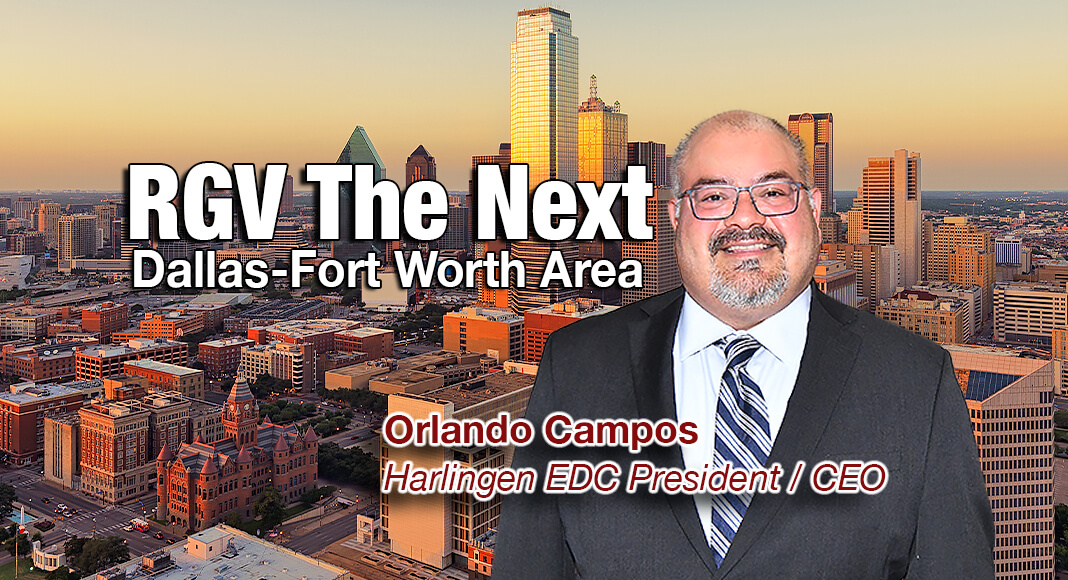
Texas Border Business
By Roberto Hugo González
The appointment of Orlando Campos as the new President and CEO of the Harlingen Economic Development Corporation (EDC) marks the start of an exciting new era in Harlingen’s business sector. The first phase of his leadership journey carries a rich tapestry of experiences across various regions and fields, from his early days in Brownsville to his remarkable successes in North Texas.
Campos’ roots lie in Brownsville, where he was born and raised. After his high school graduation, he made his way to the bustling metropolis of New York City to study at Columbia University. On returning to Brownsville, he kick-started his economic development career, first as a transit planner and then joining the Brownsville Economic Development Council (BEDC) as Director of Marketing. Campos’ tenure at BEDC enabled him to delve into business development, a skill set that would serve him well in future roles.
An opportunity at the Valley International Airport in Harlingen as the Manager of Business Development pulled Campos in a different direction. During the tumultuous period surrounding the 9/11 incidents, he served as the public information officer, providing valuable insights into the aviation industry’s shifts in regulations.
Afterward, Campos’ journey saw a return to the BEDC, this time as Vice President of Business Development. His responsibilities spanned across the US-Mexico border, helping to establish maquiladoras (manufacturing plants) in Mexico and supporting retail and back-office operations in the US.
The next step in his career path led Campos to North Texas, where he joined the Arlington Chamber of Commerce. His role in Arlington coincided with the construction of the Dallas Cowboy Stadium, granting him a unique vantage point to witness and participate in significant economic developments.
In an unexpected turn of events, Campos was recruited to be the first Economic Development Director for the town of Addison in North Dallas County. This role offered him a blank canvas to start a new department, a challenge he accepted and excelled at. Four years into the job, he was also entrusted with the town’s tourism functions, further broadening his scope of expertise.
After 12 successful years in Addison, a family event brought him back to Brownsville, sparking reflections on his career and the sacrifices he’d made in moving away. This prompted a decision to return home, culminating in his appointment as the president and CEO of the Harlingen EDC.
Campos’ experiences in various domains – from aviation to economic development and tourism – make him a well-rounded leader for Harlingen EDC. He’s made it clear that he sees immense potential in Harlingen and focuses on transforming that potential into reality.
After 16 years of polishing his skills in North Texas and just two weeks into his new role at the time of this interview, Campos is focused on understanding Harlingen’s existing initiatives and strategic plans and engaging with community leaders to refine and align future strategies. A retreat with the board, city commission, and key community stakeholders is on the cards, aimed at reviewing and refining the strategic economic development plan in the context of the post-Covid-19 landscape.
With a keen perspective on the city, Campos sees Harlingen as a place pouring with opportunity. He believes it’s not just about attracting businesses and supporting local enterprises but building a holistic approach to economic development. His plan involves identifying key factors that can attract high-paying jobs to the area.
The new president emphasizes the importance of not operating in silos and building a collaborative effort with the city and other key stakeholders. He plans to leverage a concept termed ‘placemaking,’ which involves identifying the unique assets and attributes of the community to attract investment. It’s all about developing a location that will attract high-wage earners who can live here, spend money, and make their personal investments, contributing to the community’s overall economic health.
When asked about the digital divide and the issue of low per capita income that hinders connectivity, especially among the impoverished, Campos argues that this is not just a Harlingen problem but a Texas one. As digital connectivity becomes as essential as running water and electricity, state and federal initiatives are being developed to increase this vital connection. The communities that will thrive are those that back these initiatives, which ultimately strengthen the population’s educational level.
With a wealth of experience leading initiatives in North Texas, Campos aims to replicate many of these successful strategies in Harlingen. His robust relationships with site selection consultants and national commercial real estate firms, which drive many projects, will be instrumental in these efforts.
Understanding the importance of a joint effort for overall economic development, Campos emphasizes a harmonious operation across local government bodies, nonprofits, and commercial enterprises.
Having firmly asserted his belief against working in silos, Campos endeavors to unite the city’s major stakeholders. His vision for Harlingen is not just focused on attracting businesses and supporting local enterprises. Instead, he emphasizes the need for a holistic economic development approach where every stakeholder shares a mutual vision of prosperity for Harlingen.
For Campos, being true local offers a dual advantage. While he intimately knows Harlingen’s core characteristics, his professional experience in North Texas gives him a broader perspective. He considers Harlingen to be a hub of opportunities, especially due to its political stability, vibrant international airport, young population, and availability of undeveloped sites for new development.
Campos’ vision goes beyond Harlingen, encompassing the entire Rio Grande Valley. He regards the region as “Texas’ little secret,” a rapidly growing area that is still somewhat hidden from the broader national and international economic landscape.
He continued to say that the Rio Grande Valley is a hive of activity, with a wave of new investments and businesses being attracted to the region. He pointed out that the growth and development here in the Valley since he left has been remarkable, shaping it into what he believes could be the next Dallas-Fort Worth area.
Just like North Texas, the Valley is composed of various communities whose collective success mirrors that of North Texas, achieved through collaboration. “If we want to perpetuate the positive momentum in this area, it’s essential for all communities to work together, realizing that each community’s success can influence others, and mutual support is crucial.”
With his extensive experience in economic development, Campos has his sights set on specific business sectors that could benefit Harlingen. Given the city’s history and the local labor force’s skills, advanced manufacturing and medical industries seem a perfect fit. The presence of Texas State Technical College, which can offer targeted skills training, is an additional advantage. Also, given Harlingen’s history with call centers and back-office operations, the city has a pool of experienced labor that could be directed toward the next potential suitable industries.
Campos’ journey is a testament to his relentless drive for economic development and a deep-rooted commitment to his community. Harlingen has indeed gained a leader who brings with him an abundant wealth of knowledge and an unyielding passion for catalyzing positive economic change. With Orlando Campos at the helm, the city of Harlingen’s economic landscape seems set to enter a vibrant era of growth and transformation.
With a click of a button this article can be read in 102 languages, including Spanish. Con solo hacer clic en un botón este artículo se puede leer en 102 idiomas incluido el Español.
















